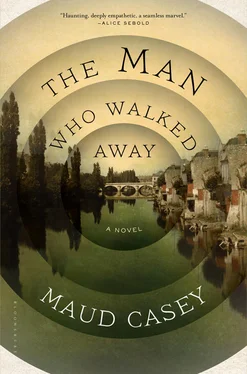“It appears. .” he says, “hunger has made them quick.”
This woman — her sagging, soft skin, her comforting smell — will soon be gone, along with the swarm of mewling cats.
“Where have you come from?” the woman asks.
He has no answer. The words fade with the disintegrating moon, an outline in the morning sky. It is not an idle threat; everything will disappear.
“It’s not far, where I’m from,” wanting to offer her something, this woman who does not tell him to go away. He is not an idiot. This is what he would like to say.
“Careful,” the woman says as a cat hisses, batting at Albert’s leg. “They can be vicious when it comes to getting what’s theirs.”
He wishes he were a cat filled with such purpose. Every morning to canter across the cobblestones on padded feet toward this woman. Albert wiggles his toes. They are a reminder: You are here, you are here . His feet have started to blister; he can feel another blister forming, the hot pinch of skin rubbing against the papery leaves with which he pads his shoes when he can’t find the soft blue moss.
“Uh-oh,” the woman says, looking over his shoulder. “Here we go again.” As she hurries away, the cats gallop after her, tails whipping back and forth as they dart between the legs of the townspeople — men, women, and children — who have gathered at the edges of the public square to see the stranger. The milk from an overturned bowl seeps into the cobblestones.
At first the gendarme standing in front of Albert is the sum of his parts taking shape in the morning light: crisp uniform, large, loose cheeks quivering over a stiff collar; his mouth moves so emphatically his cheeks cascade and quiver as he comes to the end of a sentence Albert hasn’t heard the beginning of.
There has been talk. The recent war has caused great concern: men at risk of no longer being men, women at risk of no longer being women, children at risk of never being children in the first place, at risk of never being produced, the family at risk of extinction! The gendarme, whose sentence continues even after he is finished speaking it, a ripple across the lake of those cheeks.
“I admire the cleanliness of your uniform,” Albert ventures, because this sort of flattery has worked in the past and because the man’s uniform is spotless and terrifically stiff. Albert balances there on the pin of its cleanliness, its crisp collar yoking him to the earth.
“Thank you,” the gendarme says, his sharp countenance softening for just a moment. He prides himself on being neatly dressed, on being an exemplary representative of the state. Then, coming to his senses, he stands taller. The buttons on his jacket sparkle. “Let me put this very, very. . what’s the word. . succinctly? The future of our country is at stake, sir. We lost so much in the last war — men, direction, pride. Here you are, a vagrant! You, sir, are a menace.”
“You have, it appears, confused me with someone very important,” Albert says. “I am not a vagrant.” He is not. He is not. The gendarme’s face has grown redder than the ripest tomato.
The crowd assembled on the steps of the church lean forward for a better view. They long for more than the smell of bread and a day whittled out of hours whittled out of minutes. Having never been cracked open, they long to be. The baker shares a few of his freshly baked croissants, biting the end off one himself, releasing a tendril of secret heat into the air.
Albert swirls along with that tendril, preparing to disappear into the air. Poof! But first.
“Aha!” the gendarme cries, turning to the crowd, pointing to Albert’s jiggling foot as though it is proof of his menace.
Albert is pale and swaying from his efforts to be still.
“You appear ill. Are you all right?”
Albert is not all right.
“I must go,” he says. He wants to go home. He wants nothing more than to go home and find his father sitting in his chair, smoking his pipe. How long has it been — years, or years and years, or perhaps years and years and years that are not gone, only misplaced? Years that have grown heavier in that other place; years that might crush him with their heaviness if they ever found their way back. Oh, he has grown so tired.
“Don’t go!” a small girl shouts as he turns to walk away.
The gendarme takes Albert by the arm.
“I am not a vagrant,” he says again, though doubt has inched its way into his voice.
He is not. He is not.
“Of course not,” the gendarme says, rolling his eyes. But the crowd is not with him.
“Let him go!” they cry. They don’t like the gendarme with his sparkling buttons. They prefer the man who has interrupted the rhythm of their day.
“Fascinating,” whimpers Albert as the gendarme leads him away. The townspeople on the church steps rise and walk back into their days. “Magnificent,” whispers Albert. “Yet another escapade.” He is not afraid. He is not afraid. He will not be afraid.
In the jail cell where he is held overnight, time hides under the wafer-thin mattress. It seems, what ? It appears, what ? Albert falls gratefully into sleep, only to wake with a stiff neck and a belly covered in the rash of bedbug bites familiar from other nights spent in jail.
Before the gendarme releases him the next morning, he grips Albert’s arm. This , his grip says, is how important his duty as a man and a citizen are. “You are a disgrace,” he says.
This time, when Albert begins his journey home (Which way? Which way?), the only sound is that of a merchant’s cart rattling along a distant road. The sky fills with charcoal clouds that darken the whole world and Albert too. Harbingers of nothing, the darkening clouds are reminders that every night the black sky will obliterate even these ominous smears. They remind him that even if the urge to walk arrives to save him, even if he could make it appear to lift him up and sing him into astonishment so that he forgets the misery of his waking life, he will only wake again to discover himself alone, balancing on the head of another pin.
The urgency always comes unbidden. But oh, when it does come, he is overcome. Oh, Albert . He is beautiful in this song, even to himself. A silky, silky mist. Lifted into the air, his sadness becomes part of the clouds, eventually raining back down on him transformed, spilling from the branches of poplars turned pale gold when winter’s coming. The rain comes too fast to drink; still, it quenches his thirst.
When was he ever thirsty?
What was the question?
The amphitheater is hot and loud with men with high aristocratic foreheads and aquiline noses, men from families who never doubted their sons would become anything less than doctors. Or so it seems to the Doctor from where he sits on the hard wood benches, wedged between these anointed foreheads and noble noses, so certain of their right to be here, while his low forehead and pudgy nose aren’t sure at all. How could they be sure when they were too busy vying for space on his already crowded face? He knows his crowded features give him the look of someone who is perpetually worried, of someone who has toiled. He has. Surely there must be others who were not born into the profession. Surely there must be others who spent the night in a hotel, shabbier even than their shabby apartment, in order to crash this party. Others whose parents taught them the value of humility. Then he remembers: The great doctor himself, the son of a wagon maker whose specialty was decorated carriages, has toiled too.
He comforts himself with this as he scans the faces of the men who surround him, from Vienna and Berlin and as far afield as Riga, whose dignity can’t mask their eagerness. Their eyes are fixed on the center of the theater covered in sawdust to absorb the blood should there be blood. In the center is a synoptic chart on which is scrawled in the throes of a fit and hands during paralysis , underneath which lie three plaster casts. The first bears the impression of a contorted face; the second is in the shape of two hands rigidly entwined; the third is enormous and so smooth, so fleshlike, it causes the Doctor to look again. Even after he realizes it is only a cast and not the body of an especially pale woman, it looks so fresh he suspects the woman crawled out of it moments ago.
Читать дальше












